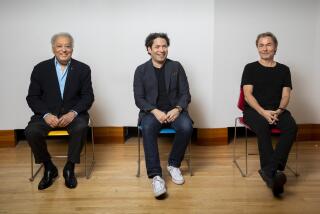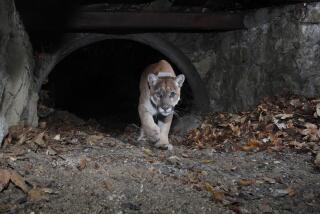Composer Michael Daugherty hears the sounds of America
Imagine a postmodern Aaron Copland or Charles Ives with a pop cultural twist, and you’re primed for the music of Michael Daugherty.
A composer of his time and birthright, Daugherty is a Cedar Rapids, Iowa, native and the musical embodiment of Americana. His canvas reflects a 20th century cultural mosaic dotted by the likes of Elvis and Superman and Jackie Onassis. At age 55, Daugherty is also the exuberant master of his craft, an artist whose sophistication and compelling appeal can seem utterly at odds with the often kitschy titles of his works.
Such is the quirky, sly, smart composer whose “Mount Rushmore” for chorus and orchestra will receive its world premiere this week at the Pacific Symphony’s American Composers Festival, led by music director Carl St.Clair.
Daugherty, the Pacific Symphony’s composer in residence for its 2009-10 season, was commissioned to write “Mount Rushmore” for the festival, themed “The Greatest Generation.” It will be performed by the symphony and the Pacific Chorale.
The new work is typical of Daugherty’s creative process. Its inspiration harks back to childhood experiences, when the family would pile into the car for road trips that included a visit to the famous granite sculpture in South Dakota where presidents Washington, Jefferson, Lincoln and Theodore Roosevelt are enshrined.
“Mt. Rushmore is a complex icon of American history,” Daugherty says. “It means a lot of different things to different people. It can be viewed as a symbol for democracy, a travesty against American Indians in that it carved up sacred ground, or a huge tourist trap, or an icon you must visit.
“I’ve always been interested in those kinds of polarizing attitudes, from Superman to Rosa Parks to Abraham Lincoln.”
Take the comic-book hero celebrated in Daugherty’s earliest work for large orchestra, the 1988 “Metropolis Symphony.” In this deceptively brilliant suite, with its funky movement titles such as “Krypton” and “Oh, Lois” and “Red Cape Tango,” you’ll find all the formative elements of the creative force Daugherty has become. You think you’re in for parody but get dramatic invention. You expect something slight and cavalier, only to be first shocked, then absorbed by music of depth and complexity.
Assured craftsmanship and persistent seriousness shape the progress of Daugherty’s compositions from “Dead Elvis” for solo bassoon and chamber orchestra (1993) and “Route 66” for large orchestra (1998) to the violin concerto “Fire and Blood” (2003) and the piano concerto “Deus Ex Machina” (2007), the last inspired by the disappearance of trains from the American landscape.
Yet the challenge of “Mount Rushmore” has drawn Daugherty onto uncharted ground. While he has one opera to his credit, the well-regarded “Jackie O” (1997), this is his first work for large chorus and orchestra. He admits he needed a compass.
So he went to the examples of Britten’s “War Requiem,” Verdi’s “Requiem” and Poulenc’s “Gloria.”
“I was looking for what works in balancing chorus with orchestra,” he says. “First of all the choir has to carry the piece. So first I wrote the choral part and workshopped that with piano, then added the orchestration.”
Daugherty, who teaches composition at the University of Michigan, found a ready test bench in the University of Michigan Chamber Choir and a knowing advisor in its director, Jerry Blackstone.
The composer’s home studio, just off campus on Ann Arbor’s old west side, is surrounded by large elm trees on the outside and is resonant of his eclectic spirit within. Bookshelves are packed with antique-store finds, “Star Trek” collectibles and 1950s science-fiction movies. At the center of it all are the instruments of his trade.
“I work like a director in a film,” Daugherty says. “I work off the energy of the actors or in this case the singers. A lot of composers rely strictly on technology, but the human element is very important to me. I do have my own little world -- my studio with my computer and MIDI gear, but in the end the music has to be performable.”
John Alexander, artistic director of the 140-voice Pacific Chorale, calls the result “very accessible to the singers as well as to the listener. The colors Michael creates in the work come from a very inventive orchestration that continually weaves itself around the choral declamation of the texts.”
Alexander also notes a strong resemblance in “Mount Rushmore” to Copland’s approach to Americana, with its strong rhythmic intensity and vigorous melodies. And one can’t help thinking of Charles Ives in Daugherty’s colorful peppering of such period tunes as “Chester,” “Yankee Doodle,” “ Rock of Ages,” “Dixie” and, of course, the “Battle Hymn of the Republic.”
Yet by no means do these quotations summarize Daugherty’s effort at spiritual authenticity. Not only did he visit Mt. Rushmore several times before beginning work, but he made pilgrimages to Washington’s home, Mount Vernon; Jefferson’s home, Monticello; the Gettysburg battlefield; and the Dakotas, whose natural splendor inspired Teddy Roosevelt’s creation of the National Park Service. And he read extensively.
“With Jefferson,” Daugherty says, “you have these collisions between his ideals and practical reality -- and his ambivalent attitude toward slavery. Both Jefferson and Washington were reluctant presidents. Washington dreamed of becoming a farmer.
“Lincoln was the pontificator, on the mountain. Roosevelt was robust, masculine. He loved the wilderness and uncharted territories.”
Daugherty distilled his texts from the writings of each man. From Washington, we hear: “I will move gently down the stream of life until I sleep with my fathers.” In Jefferson’s words resound the terse essentials of the Declaration of Independence: “Tyranny, Liberty, Slavery, Dignity, Justice.” Roosevelt celebrates “the hardy life of the open.” And we are reminded in Lincoln’s rhetoric of those who fought and died that democracy should not perish from the earth.
The trail that led Daugherty to “Mount Rushmore” can be traced to his Iowa roots. But he says his love of Americana bloomed only at long distance.
The product of a musical family in which everyone played an instrument or sang, Daugherty taught himself to play piano at age 8, then migrated to drums and played with rock, jazz and country bands while growing up.
After taking up composition at North Texas State University, he relocated to New York for studies with Charles Wuorinen at the Manhattan School of Music.
A Fulbright Fellowship enabled him to go to Paris, where he won the notice and nurturing of celebrated avant-garde composers such as Pierre Boulez and Luciano Berio. Later he worked with György Ligeti.
“I liked the music of those composers,” Daugherty says, “but sometimes you have to be far away from something to see what really moves you emotionally. I realized the thing that meant most to me was my experiences growing up in America.”
In 1980, Daugherty returned to the U.S. for doctoral studies at Yale University with Jacob Druckman. At Yale he also met and became fast friends with another bright young composer, Los Angeles native David Lang, who would go on to help found the seminal Bang on a Can Festival in New York City. Lang’s “Little Match Girl Passion” won the 2008 Pulitzer Prize.
What first impressed Lang about Daugherty in their student days was the Iowan’s size. He’s well over 6 feet tall, broad shouldered and instantly approachable. “He was the Shaquille O’Neal of classical music,” says Lang, who now teaches at Yale. “He was really into strange jazz and playing all sorts of weird music as a keyboardist. Now he’s everywhere. He might be the most recorded American composer.”
St.Clair, whose friendship with Daugherty goes back many years, offers a sort of inverted compliment: “Michael is not a composer who is long in the tooth. He deals with popular idioms, but his way of capturing them is distinctly his.”
Indeed, Daugherty says he’s surprised more composers haven’t joined his pursuit of Americana.
“After all these years,” he says, “I’m still the Lone Ranger.”
Johnson is the music critic for the Detroit News.
More to Read
The biggest entertainment stories
Get our big stories about Hollywood, film, television, music, arts, culture and more right in your inbox as soon as they publish.
You may occasionally receive promotional content from the Los Angeles Times.










